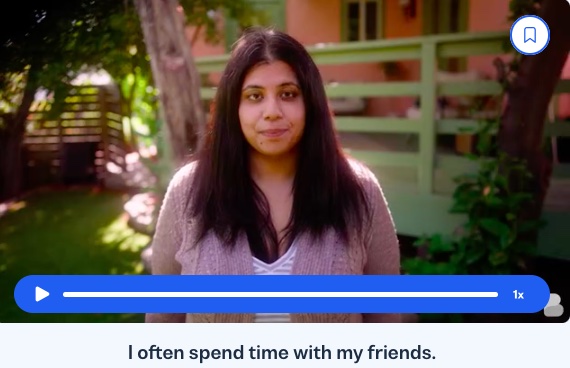70 Useful English Adverbs and How to Use Them
Use adverbs to bring deeper meaning when expressing yourself in English.
I want to learn...
Adverbs are a great way to add granularity and emphasis to your English conversations. With practice and over time, you can use them confidently in your discussions with native English speakers, thus making you sound like a natural.
Read our article on how to learn English easily if you’re looking for new ways to practice the language of Shakespeare.
Adverbs are a great way to add granularity and emphasis to your English conversations. With practice and over time, you can use them confidently in your discussions with native English speakers, thus making you sound like a natural.
Read our article on how to learn English easily if you’re looking for new ways to practice the language of Shakespeare.
What is an adverb in English grammar and how is it formed?
Let’s start with the basics and define what an adverb is. In English, adverbs are words that modify a verb, an adjective or another adverb. They are commonly used to add detail and weight to what is being said.
When you want to form an adverb, you can add -ly to the end of adjectives (e.g., quickly, slowly). Adverbs can also be individual words (e.g., always, never).
What do adverbs do?
Adverbs are most commonly used to describe how someone does something.
For example: “He ran quickly across the field.” In this case, “quickly” is an adverb that alters the verb “ran”. It provides the audience with more information about the way “he” ran.
Adverbs can also be used to describe when something happened. That is to say, the moment in which it happened.
Let’s put this in perspective with the following example:
“I recently saw a movie.” In this situation, “recently” is an adverb that gives information around the verb “saw”. It provides us with more insight about when this action took place.
When wanting to describe the degree to which something happened, adverbs are also the preferred solution.
For example: “She almost fell down the stairs.” “Almost”, in this instance, is an adverb that amends the verb “fell”.
Finally, adverbs are ideal to describe the degree and intensity of an adjective or of another adverb.
Let’s look at the following example: “The waves were very high.” In this basic sentence, the adverb “very” is enhancing the adjective “high”.
Placement of adverbs
Although in English the placement of adverbs is essential, there is room for some flexibility. An adverb can be used for two different scenarios. First, it can be placed to solely enhance a used adjective. Secondly, it might be utilized to bring more weight to an entire sentence.
Let’s look at both possibilities below.
Modifying an entire sentence
If you’re looking to amend an entire sentence, you would typically put an adverb at the beginning or at the end of that sentence.
For example, you can place the adverb after the verb “to be” or after auxiliary verbs like “must” or “have” and before verbs that aren’t auxiliary.
For instance: “Usually, I like to sit in the park when it’s sunny.”
As “usually” changes the entire sentence here, it can be placed at the beginning of it.
Modifying an adjective
When you modify an adjective, you’re just adding a degree of intensity to the adjective itself, rather than the entire sentence.
You might use it in cases like: “The sun was very hot today.”
In this sentence, you’re making it clear that the sun wasn’t just hot – it was very hot, which adds a degree of intensity to the adjective that wasn’t there before.
So, with the above in mind, do you want to learn some essential English adverbs? Let’s put this theory into practice and give it some context. There’s plenty of room to play with adverbs in English!
70 English adverbs with usage examples
Here is a list of adverbs with their own examples of usage in a sentence to guide you:
When you want to describe the time that something will take
Adverbs can come in handy and help you to tell someone how long something will take, or how often you can expect something to show up. For instance, if you want to tell someone how quickly or slowly you think the bus or train will come.
- Immediately – He immediately left the room.
- Quickly – He quickly finished the project.
- Slowly – She moved slowly across the room.
- Soon – The clouds will disappear soon.
- Now – Come to dinner now.
- Later – I’ll call you later.
- Occasionally – We occasionally watch a movie together.
- Immediately – He immediately left the room.
- Eventually – We eventually reached our destination.
- Fast – He runs fast.
- Suddenly – Suddenly, the curtains opened.
- Nearly – We nearly missed the train.
- Gradually – The effects of the drug gradually wore off.
- Rarely – He rarely goes to the movies.
- Always – He always arrives late to meetings.
- Never – I never forget my keys.
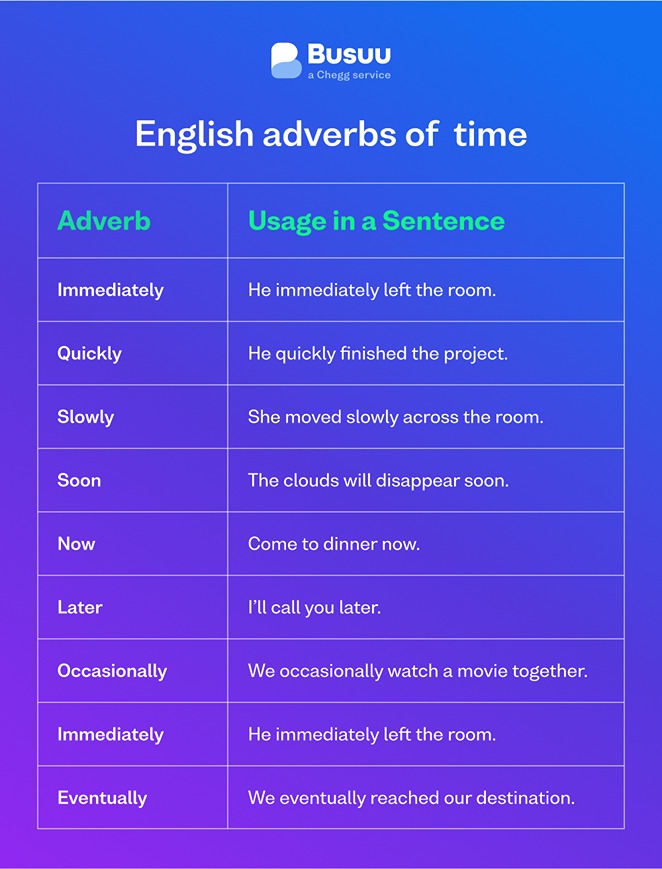
Adverbs used for when you want to compare or describe the quantity or size of something
If you want to describe the quantity of something, adverbs are the solution. These types of adverbs are often used to help you compare elements. Below are a few examples:
- Significantly – His grades have improved significantly.
- Hardly – I can hardly speak English.
- Adequately – He performs adequately at work.
- Together – We worked together on the project.
- Vastly – His skills vastly improved over the years.
- Barely – We barely had enough money for dinner.
- Fully – He was fully prepared for his presentation.
- Deeply – He was deeply moved by her words.
- Broadly – Our findings are broadly applicable.
- Globally – The impact was felt globally.
- Locally – The benefits are felt locally.
- Completely – His house was completely destroyed.
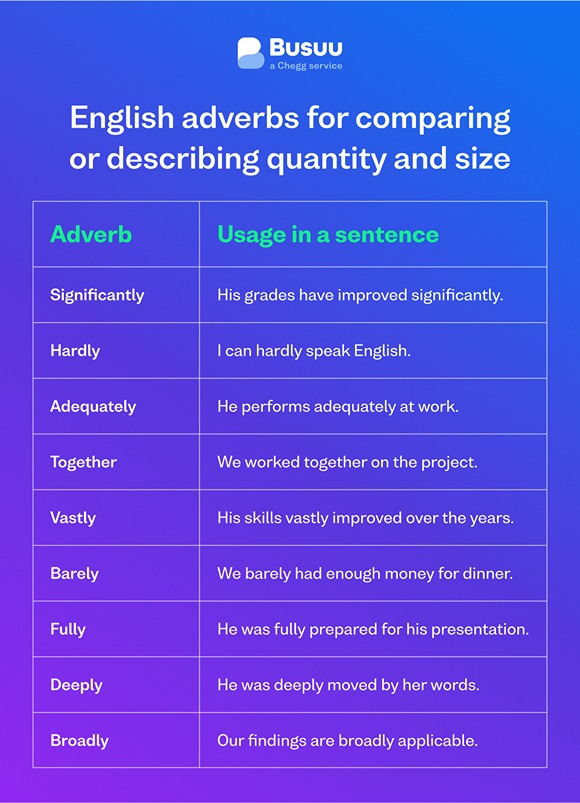
Ideal adverbs for when you want to describe actions
These adverbs are convenient for communicating to someone how another person did something.
For example: “She quietly closed the door behind her.” This shows how you can add additional information about how an action was completed.
- Inevitably – This was inevitably going to happen.
- Dramatically – The actor dramatically delivered his lines.
- Strongly – He strongly believes in his cause.
- Quietly – She quietly closed the door behind her.
- Happily – We happily accepted the invitation to dinner.
- Sadly – He sadly said goodbye to his family.
- Obviously – It was obviously a difficult decision.
- Professionally – She professionally handled the situation.
- Perfectly – The cake was perfectly cooked.
- Easily – She easily passed her final exam.
- Hard – She works hard.
- Aggressively – She aggressively defended her opinion.
- Proactively – We need to address this issue proactively.
- Alone – Did they travel alone?
- Likely – He is likely to be late for work.
- Literally – He literally flew across the room.
- Criminally – His behavior was criminally reckless.
- Normally – She normally brings her lunch to work.
- Properly – This needs to be done properly.
- Flexibly – He works flexibly with his team.
- Nervously – She nervously laughed at her mistake.
- Honestly – Honestly, I don't know the answer.
- Reluctantly – I reluctantly agreed to go along with it.
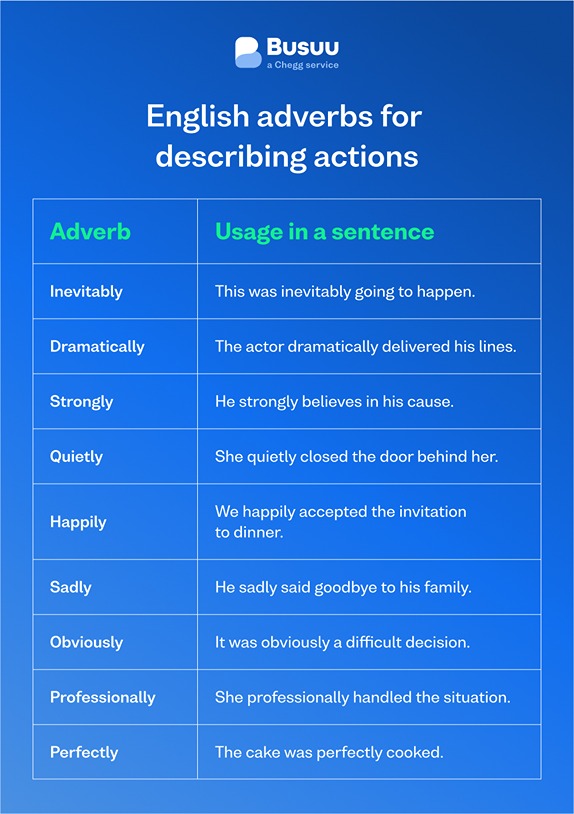
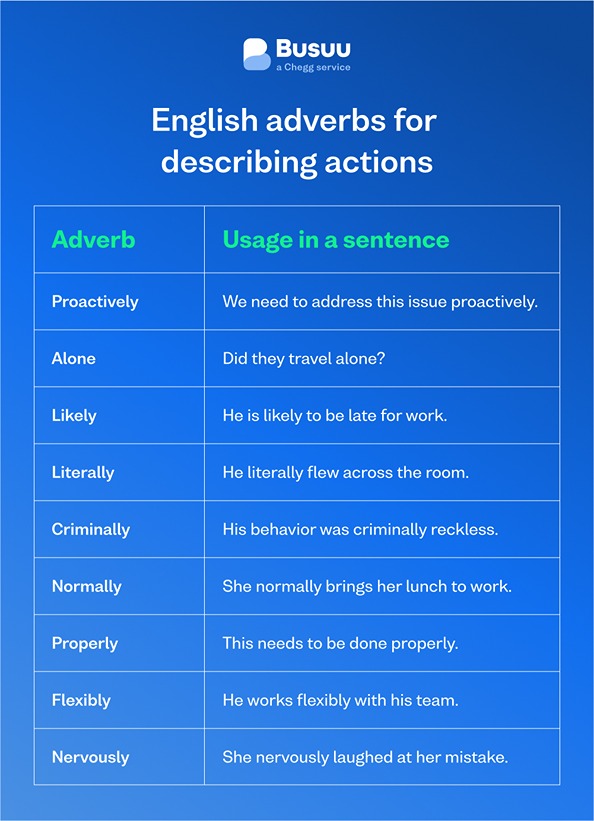
Best adverbs for describing a situation
If you’re telling someone a story about something that happened to you, adding in a few adverbs can help make it more compelling. It also gives someone an idea as to how you felt about the situation, too!
You can also use adverbs to tell someone how you plan to do something; you might “adjust your plans accordingly”, for instance.
- Surprisingly – Surprisingly, the sun was shining through the clouds.
- Genuinely – It genuinely seemed like it was going to be a great day.
- Accordingly – We will adjust our plans accordingly.
- Automatically – The computer automatically shuts down.
- Presumably – It will presumably be difficult to finish all of the food.
- Partially – The project is partially finished.
- Mainly – This is mainly used for research purposes.
- Potentially – There are potentially many side effects.
- Alternatively – We can use this material alternatively.
- Simply – It's simply not possible.
- Visibly – It was visibly clear outside.
- Extremely – It was harder to drive as it was extremely foggy.
- Intensely – That hill was intensely steep.
- Unusually – The weather is unusually cold this year.
- Ultimately – It will ultimately be up to you.
- Principally – This is principally done by hand.
- Notably – This is notably true in winter months.
- Clearly – The directions were clearly marked.
- Interestingly – Interestingly, it was easier to get to our destination than expected.
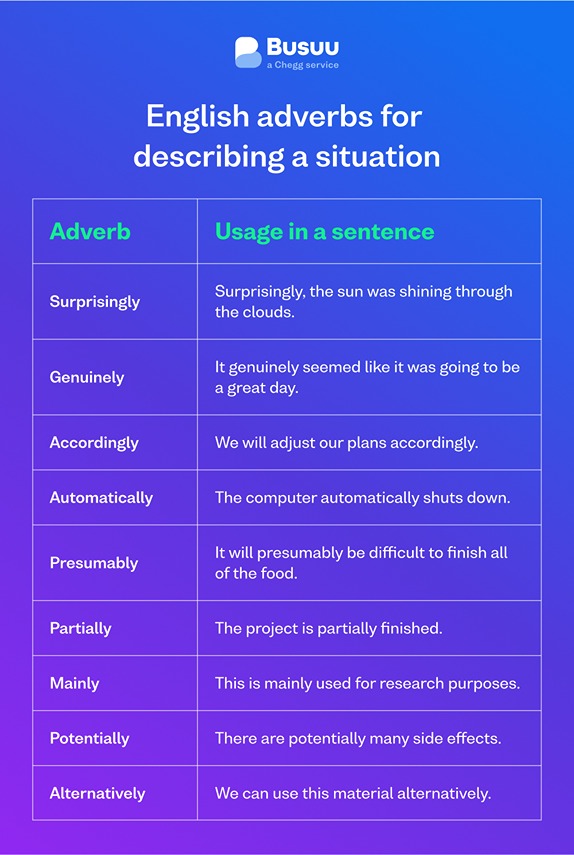
By understanding how adverbs are used in English, you can add more detail and emphasis to your writing and your conversation. Like with anything, practice and repetition will help you with the use of them. Throw yourself in and practice so that you can become a natural at using adverbs in English everyday vocabulary.
We hope this list of adverbs will help you make your English stronger, more interesting and expressive.
Looking to learn a new language?
Take your grammar skills to the next level with Busuu and start learning English - or one of the other 14 languages we offer!
